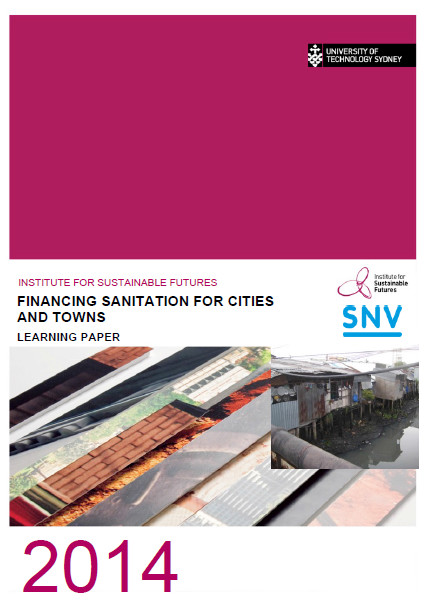Financing Sanitation for Cities and Towns: Learning Paper
 |
rapport Dec 2014 ; 47 pages
Aut. Kumi Abeysuriya & Antoinette Komé & Juliet Willetts &
Ed. ISF - Sydney
Téléchargeable sous format: PdF
Abstract:
The aim of this document is to provide a wide audience a user-friendly resource on financing for urban sanitation. The paper brings together existing information in an accessible language that does not assume the reader is already an expert in financing. The paper describes and clarifies current financing principles and approaches, provides multiple global case examples of innovative financing for urban sanitation and, discusses some emerging and new financing concepts and approaches. The focus of this paper is on access to the upfront finance and other ‘lumpy’ finance needs,for initial investment and for rehabilitation/replacement as physical systems approach their end of life. The core principle that this document promotes is that governments have responsibility for enabling sanitation services to their constituents, in line with their role as protector of fundamental human rights, including the human right to water and sanitation. The paper addresses a key challenge in the emerging sanitation sector in developing countries that many sanitation planners do not think adequately about financing lifecycle costs, and make assumptions about the ability of tariffs to cover ongoing costs while also being affordable – which leads to insufficient revenues in practice.
The two key messages from this learning paper are:
• The ‘Sustainable Cost Recovery’ paradigm is critical for exploring scalable financing schemes for urban sanitation. Moving beyond the conventional ‘full cost recovery through tariffs’ mindset is likely to be the key to securing the financing required to support large scale deployment of sanitation solutions. The proposition of an alternative paradigm for cost recovery that departs from ‘full cost recovery through tariffs’ is an acknowledgement that affordable and equitable tariffs will never be adequate to fund the costly infrastructure associated with sanitation services in developing countries (especially when pipe networks are involved)."
• Government's responsibility for enabling sanitation includes contribution of public funds to support sustainable full cost recovery that ensures long term services that are not reliant on tariffs alone. With this responsibility comes a need for a city-wide perspective to sanitation budget planning, to ensure effective and equitable distribution of public funds to achieve public health and environmental outcomes.
Mots clefs: |
assainissement (CI) (DT) (OP) , financement (CI) (DT) (OP) , urbain (CI) (DT) (OP) |
Editeurs/Diffuseurs: |
|
ISF
-
Institute for Sustainable Futures - Sydney - Australie |
SNV
-
Organisatie voor ontiwkkelings samenwerking en bewustwording - Den Haag - Pays Bas |
En cas de lien brisé, nous le mentionner à communication@pseau.org